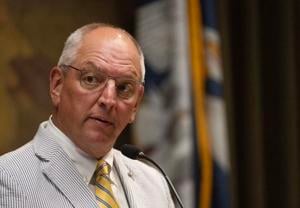
During his seven-plus years in office, Gov. John Bel Edwards has extended Medicaid to 780,000 working poor people, raised taxes to close a huge budget deficit, imposed restrictions on all citizens to safeguard public health during the pandemic and reduced prison sentences for thousands of non-violent offenders.
Now Edwards is facing another consequential decision during his final months in office – whether to commute the sentences for any or all of the 51 condemned inmates who asked on Tuesday to be spared the death penalty.
No death row inmates who receive clemency would be freed. They would be sentenced to life in prison without parole. If Edwards granted clemency to all of them, only six inmates would be left on death row.
At least for now, the governor isn’t giving a window into his thoughts going forward. But people close to him agree that his devout Catholic beliefs will guide his decision, not politics.
“I’m sure he would engage with people he trusts – including people like the archbishop – but this would have to be a very personal decision for him,” said one person close to Edwards who spoke on the condition of anonymity. “I’ve never met anyone who trusts his gut as much as he does. At the end of the day, he knows he would have to be the one signing the clemency application.”
Over the past 20 years, one governor in Illinois and another in Oregon have moved all of their states’ inmates off death row.
Edwards cannot do that on his own. He can only act on cases where the five-member Pardon Board, whose members he appoints, has recommended clemency.
If he decides to take that move, politics will likely play a role in the timing. Edwards likely won’t act until after voters choose his successor in November, to keep his decision from being targeted during the race by those who disagree with him.
Approvals likely
Another person who knows the governor closely expects he would approve any clemency applications that reach his desk, given the criticism he has already faced for stating his opposition to the death penalty.
“Why would he take the political shellacking and not do it?” said Mary-Patricia Wray, a 2015 campaign aide who works for a group that opposes the death penalty. “He would never take the heat and then not do something.”
Edwards didn’t reveal his position on the death penalty during his first seven years in office, other than to say he would uphold state law. Louisiana hasn’t executed anyone in more than a decade, in part because of a lack of supply of the drugs used in executions.
On Feb. 9, Edwards held his annual meeting with the state’s Catholic bishops at the Governor’s Mansion.
The six bishops who attended asked him to come out against the death penalty.
He did so a month later during a talk at Loyola Law School. He cited his Catholic faith, saying that opposition to the death penalty is consistent with his opposition to abortion.
“It’s another example of how I think being pro-life has got to mean more than the issue of abortion,” he said.
In April, Edwards for the first time asked state lawmakers to support legislation to abolish capital punishment.
“I am asking that you look at the death penalty in Louisiana in 2023 with fresh eyes and an open mind,” he said as he opened the legislative session. “In short: it is difficult to administer – one execution in 20 years. It is extremely expensive – tens of millions more spent prosecuting and defending capital cases, and tens of millions more spent maintaining death row over those same 20 years.
“Our criminal justice system is far from perfect. Over the same 20 years there have been six exonerations from death row and more than 50 reversals of sentences and/or convictions. It doesn’t deter crime. It isn’t necessary for public safety. And more importantly, it is wholly inconsistent with Louisiana’s pro-life values as it quite literally promotes a culture of death.”
Six weeks later, the House Criminal Justice Committee took up the bill Edwards supported, by Rep. Kyle Green, D-Marrero, and killed it.
That was no surprise in a Republican-dominated state where a 2022 LSU Manship School poll showed GOP voters support the death penalty by a 70-20 margin.
Overall, the state’s voters backed capital punishment by a slimmer margin: 51-38. That was down seven points from the 20-point margin in a 2018 survey.
A raft of petitions
On Tuesday, five days after the legislative session ended, lawyers filed commutation petitions for 51 of the 57 inmates on death row.
Archbishop Gregory M. Aymond offered his support.
But the blowback began immediately.
Attorney General Jeff Landry, the front-runner in the race to replace Edwards, said he would oppose any clemency requests for death row inmates. So did several families of victims.
The Louisiana Sheriffs Association, which endorsed Edwards twice but is known for its law-and-order stances, hasn’t taken a position yet on the issue, said Michael Ranatza, the group’s executive director. Ranatza’s wife, Sheryl, chairs the Pardon Board.
The district attorneys who have seen the recent clemency applications are uniformly opposed to them, said Loren Lampert, executive director of the Louisiana District Attorneys Association.
“They’re working on building the opposition,” Lampert said.
The next step for Edwards is to decide whether to ask the Pardon Board to hold hearings on the 51 applications.
The board’s rules require it to notify district attorneys and victims’ families at least 60 days before a scheduled hearing. The board also typically takes nine months to a year after an application is made before holding a hearing, and that includes “a thorough investigation,” said Francis Abbott, the board’s executive director.
How Edwards might shorten that timeline is not clear.
Abbott said Edwards can put the clemency applications on the Pardon Board’s docket – each case typically gets a 30-minute hearing – or call for special meetings. At least four of the five pardon board members have to approve a clemency recommendation, Abbott added.
The board’s members include two retired judges, two former top state corrections officials, and a victims’ advocate. One member played a role in executions. Another represented a defendant sentenced to death.
If Edwards pushes the board to hear the cases before he leaves office in January, he will listen to what politicians, victims’ families and others say, those close to him believe.
What won’t sway him
But they say that won’t ultimately sway him.
“I do not think he’ll look at it from a political standpoint,” said Ben Nevers, who served as his first chief of staff. “He’ll look at it from a faith-based standpoint.”
While Edwards doesn’t wear his religion on his sleeve, he and his wife, Donna, pray together every morning, and he’s been known to pray on the job with others when facing meaningful decisions.
When Edwards travels on a weekend, his staff finds a local church where he can attend Mass.
“Regardless of one’s position on this matter, I know that the governor seeks to have his faith in Christ inform his decision-making,” said the Rev. Rodney Wood, who organizes a weekly Bible study and prayer group during the legislative session that Edwards faithfully attends.
For now, Edwards is limiting his comments.
“I have never told an individual member of the Pardon Board, or collectively, what I would want them to do,” he said Wednesday. “I think they have to exercise their own judgment. You all know how I feel about the death penalty itself, because I’ve made multiple statements about it over the last several months.”
Illinois and Oregon
Twenty years ago, then-Gov. George Ryan of Illinois was faced with a similar choice about death row inmates after the state Legislature refused to revamp the state’s capital punishment laws to reduce the chances of an innocent person being executed.
Days before he left office, Ryan commuted all 167 death sentences to life in prison.
“It’s not an easy decision to make,” Ryan said on Friday. “I had one person on my staff who agreed with me. Everyone else on my staff said, ‘Don’t do it.’ I just decided I had to do it to live with myself. It’s got to come from your gut.
“I think I did the right thing,” he added.
In December, then-Gov. Kate Brown, on her way out of office, commuted all 17 death sentences in Oregon to life in prison.
Unlike in Louisiana, Oregon’s Supreme Court and its legislature were already narrowing the opportunities to execute people there, Brown said Friday.
“These are very personal decisions, really based on faith and principle and your core belief on the role of government and delivering a criminal justice system that is fair and equitable,” Brown said.
Staff writers James Finn and John Simerman contributed to this article.

Leave a Reply